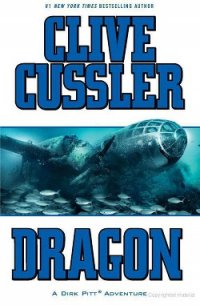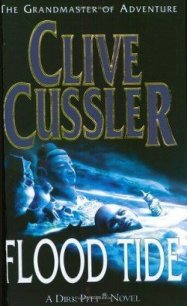Black Wind - Cussler Clive (книги полностью бесплатно txt) 📗
Despite Giordino's request for a low-flying pass over Malibu, Pitt steered the airship directly offshore from Oxnard after leaving the grounds of the airport and soon leveled the blimp off at a height of twenty-five hundred feet. The Pacific Ocean resonated a deep aqua color under a bright sun, and the men easily counted out the northerly Channel Islands of Santa Cruz, Santa Rosa, and San Miguel under the clear skies. As they floated east, Pitt noticed dew dripping off of the blimp, its fabric sides warming under the rays of the morning sun. He glanced at a helium pressure gauge, noting a slight rise in the needle as the helium expanded from the warming temperatures and higher cruising altitude. An automatic venting system would release any excess gas if the pressure rose too high, but Pitt kept the blimp well below its pressure height so as not to needlessly stave off helium.
The controls of the Sentinel 1000 were heavy in his hands and he noted that the sensation of flying the blimp felt closer to sailing a twenty-meter racing yacht than piloting an airplane. Turning the huge rudders and elevators required some muscling of the yoke, which resulted in an anxious pause before the ship's nose would gradually respond. Correcting course, he absentmindedly watched the lines dangling off the blimp's nose sway back and forth. A boat bobbed into view beneath them, which he recognized as a charter fishing boat. The tiny-looking day fishermen on the boat's stern suddenly waved up at them with friendly abandon. There was something about an airship that always seemed to strike a warm chord with people. They captured the romance of the air, Pitt decided, offering a reminder of times past when flying was still a novelty. With his hands on the controls, he could feel the nostalgia himself. Floating at a leisurely pace over the water, he let his mind churn back to the days of the thirties when mammoth dirigibles like the Graf Zeppelin and Hindenburg shared the skies with the huge Navy airships Akron and Macon. Like the opulent cruise ships of the same era, they offered a certain relaxed majesty that simply no longer existed in modern travel.
When they reached a distance of thirty miles offshore, Pitt angled the blimp south and began navigating a large, lazy arc off the Los Angeles metropolis. Giordino powered up the LASH optical system, tied into a laptop computer, which enabled him to spot the images of incoming surface vessels up to thirty-five miles away. The freighters and containerships came chugging in toward the ports of Los Angeles and Long Beach at a sporadic yet endless pace. The big vessels hailed from a variety of exotic-sounding home ports from Mumbai to Jakarta, though China, Japan, and Taiwan accounted for the largest volume of traffic. More than three thousand vessels a year entered the adjacent ports, creating a constant stream of traffic that crawled across the Pacific toward America's busiest port like ants to a picnic. As Giordino studied the laptop, he reported to Pitt that he could spot two large vessels inbound in the distance that figured to be commercial ships. Squinting out the cockpit window, Pitt could just make out the leading vessel on the horizon.
“Let's go take a look,” Pitt replied, aiming the nose of the airship toward the approaching ship. Flicking a button on the Coast Guard radio set newly installed in the cockpit, he spoke into his headset.
“Coast Guard Cutter Halibut, this is airship Icarus. We are on station and preparing to survey two inbound vessels approximately forty-five miles due east of Long Beach, over.”
“Roger, Icarus” came a deep-voiced reply. “Glad to have you and your eyes in the sky with us. We have three vessels deployed and engaged in current interdiction actions. We'll await your surveillance reports on new inbound vessels as they approach. Out.”
“Eyes in the sky,” Giordino grumbled. “I'd rather be the stomach on the sofa,” he said, suddenly wondering if anyone had packed them a lunch aboard the airship.
Throughout the night, the Odyssey had churned west, inching her way closer to the California coast that she had departed just days before. Tongju returned to the platform after resolving the launch position dispute and stole a few hours of sleep in the captain's cabin before rising an hour before dawn. Under the first trickles of morning light, he watched from the bridge as the platform followed in the Koguryo's wake, noticing the shadow of a sizable island in the distance off the starboard bow. It was San Nicolas Island, a dry and windblown rock farthest from shore of all the Channel Islands and owned by the Navy for use primarily as an amphibious training site. They continued west for another hour before the radio crackled with the voice of Captain Lee.
“We are approaching the location that the Ukrainian engineers have indicated. Prepare to halt engines, and we will take up position to the southeast of you. We will be standing by to initiate launch countdown at your direction.”
“Affirmative,” Tongju replied. “We will set position and ballast the platform. Stand by for positioning.”
Tongju turned and nodded to one of Kang's undercover crewmen who was piloting the Odyssey. With skilled confidence, the helmsman eased off the platform's forward-propulsion throttles, then activated the self-positioning thrusters. Using a GPS coordinate as a fixed target, the computer-controlled system of forward, side, and rear thrusters was activated, locking the Odyssey in a fixed position as if parked on a dime.
“Position control activated,” the helmsman barked in a crisp military voice. “Initiating ballast flooding,” he continued, pushing a series of buttons on an illuminated console.
Two hundred feet below the pilothouse, a series of gate valves were automatically opened inside the twin pontoons and a half-dozen ballast pumps began rapidly pumping salt water into the hollow steel hulls. The flooding was imperceptible to those standing on the platform deck, as the computer-controlled pumps ensured an even rate of flooding. On the bridge, Tongju studied a computerized three-dimensional image of the Odyssey on a monitor, its catamaran hulls and lower columns turning a bright blue as the seawater poured in. Like a lethargic elevator ride, as the men on the bridge watched rather than felt, the platform sank slowly toward the waves. Sixty minutes passed before the platform gently dropped forty-six feet, the bottom of its twin hulls submerged to a stabilizing depth seventy feet below the surface. Tongju noted that the platform had ceased its slow swaying evident earlier. With its submerged pontoons and partially sunken pilings, the Odyssey had become a rock-stable platform from which to launch a million-pound rocket.
A buzzer sounded as the designated launch depth was attained, the rising blue water on the monitor graphic having reached a red horizontal line. The helmsman pressed a few more buttons, then stood back from the console.
“Flooding complete. Platform is stabilized for launch,” he said.
“Secure the bridge,” Tongju replied, nodding toward a Filipino crewman who stood near the radarscope. A guard standing near the door was waved over and quickly escorted the crewman off the bridge without saying a word. Tongju followed out the rear of the bridge, entering a small elevator, which he rode to the floor of the hangar. A dozen or so engineers were hovering around the huge horizontal rocket, examining an array of computer stations that were wired directly into the launch vehicle. Tongju approached a thick-haired man with round glasses named Ling who headed up the launch operations team. Before Tongju could speak, Ling gushed with a nervous testimony.
“We have verified final tests on the payload with positive results. The launch vehicle is secure and all electromechanical systems have tested nominal.”
“Good. The platform is in the designated position and ballasted for launch. Is the rocket ready to be transported to the launch tower?”




